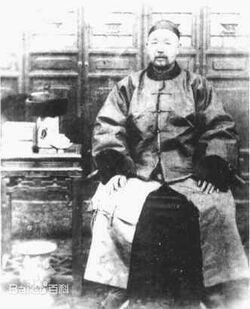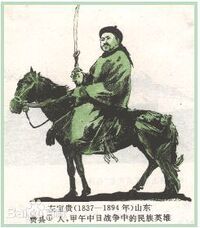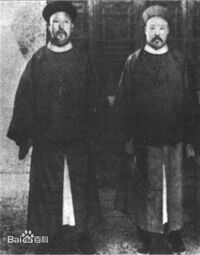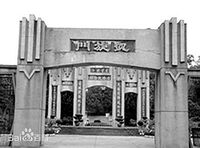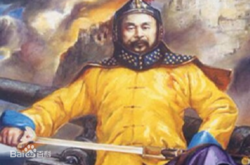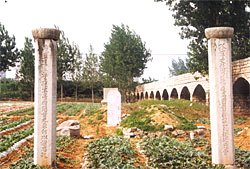زوو باوگوي
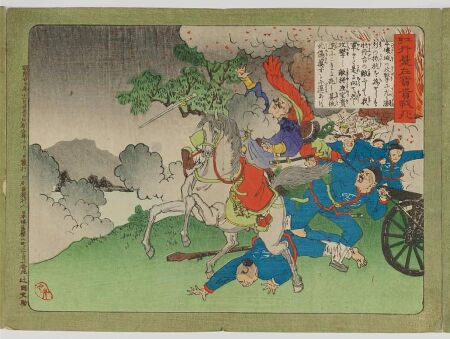
زوو باوگوي (الصينية: 左寶貴؛ إنگليزية: Zuo Baogui؛ 1837، مقاطعة شاندونگ – 1894، پيونگ يانگ) كان جنرالاً مسلماً من الهوي في أسرة تشينگ قاتل في الحرب الصينية اليابانية الأولى. وقد لقي مصرعه في القتال بمعركة پيونگ يانگ في 1894. وقد أفيد أن القوات المسلمة تحت إمرته استبسلت في القتال حتى لقي مصرعه حين أصابته دانة مدفع. ولاحقاً، أقيم نصب تذكاري تكريماً له.[1][2]
النشأة
وُلِد في أسرة من الفلاحين الفقراء، مات والداه وهو صغير، ولم يتركاه له إرثاً. وفي السنة السادسة من عهد شيانفنگ الامبراطور التحق بثكنات الجيش، خادماً لألف من الجنود، ثم ترقى ليصبح فدائياً ثم ملازماً في القيادة العليا في محافظة وِيْ، گوانگدونگ ومناصب أخرى حتى أصبح أميرالاً.
سيرته القتالية
الخبرة المبكرة
Zuo Baobao, named Guan Ting, was from the local town of Feixian County (now the local town of Pingyi County ) in Shandong Province . Born in a poor Hui peasant family on October 18, 1837. His father's name was Zuo Shirong, and his mother was Yang, both of whom died young. He was lonely and had no family property to maintain a basic life. He had to live with his second brother Zuo Baoxian and third brother Zuo Baoqing, Zuo Shihong, his widow uncle Zuo Shihong, and suffered from the sufferings of the world. Slightly longer, because of offending the evil young man in the village, he had to leave his hometown to make a living by setting up a street stall as a cobbler, living a life of clothing and food. In 1856, Zuo Zhigui was forced to take his two brothers to join the Jiangnan army camp and began his military career. [5] In 1856, he belonged to Jiangnan Daying and participated in the suppression of the Taiping Heavenly Kingdom. In 1865, from Seng Gelinqin crusade against the Nian Army uprising. In 1868, guerrillas in Tianjin town were supplemented. The Nian Army failed, promoted to the general with merit, and rewarded with the rank of lieutenant. [6] In 1872, Feng Miao went to Rehe Chaoyang to suppress the "horse thief", accumulating merits to make up for the lieutenant, and rewarding the rank of the general. In 1875, he led his ministry from Shangshu Chongshi of the Ministry of Criminal Justice to Feng and Kyrgyzstan to investigate and handle cases. Since it is the guest army stationed in Fengtian. [7] In 1880, was ordered to command Fengjun, and Prime Camp wing Zhang . Because of the seriousness of the army, the general Qingyu and the academic Li Hongzhang entered the performance with "diligence and loyalty, valor and hardworking, knowledgeable in the military, courageous and excellent", and the admiral was named as the admiral. In 1889, he was awarded the commander of Gaozhou Town, Guangdong, and still stayed in Fengtian. [8] Zuo Baobao has been stationed in the army for 20 years. He not only "smarts military affairs, seeks courage and excellence", but also enthusiastic about local public welfare undertakings, attaches importance to education, and establishes a number of volunteers. Charitable organizations such as the disaster relief porridge factory, Tongshantang and Qiliusuo have also been established. [9] In the autumn of 1891, for participating in the suppression of the Jindan Taoist Uprising in Chaoyang, Rehe ( see: Jindandao Uprising ), he was rewarded with wearing a yellow mantle, [10] and a headpiece. In 1894, for the 60th birthday ceremony of the Empress Dowager Cixi , she was rewarded with flowers in her eyes. [8]
الزحف على پيونگ يانگ
Sino-Japanese War Sino-Japanese War
In July 1894 , the Sino-Japanese Sino-Japanese War of 1894-1895 broke out and North Korea was in a hurry. The Qing court ordered Zuo Baogui to lead his troops into the dynasty and stationed in Pyongyang . On July 20, Zuo Baobao and his army set off from Fengtian and arrived at Jiuliancheng on the 29th . He sold Pyongyang's rice prices at a lower price, so he paid off the whole bank, and wanted to use money to buy rice locally to ensure the supply of military food. They sent people back to Fengtian to retrieve winter clothes to stabilize the military and prepare for a protracted battle. Arrived in Pyongyang on August 6, 1894. And left at the same time valuable Feng Xi Yi, to Pyongyang as well as military Ma Yukun part, Sheng Jun Wei Yu expensive part and abundance liter Arab troops under his command Mukden military training camp Sheng word, Jilin military training and other four units, namely 29 battalion of more than 13,000 people. History said that the four armies entered the dynasty. [11] After the four armies entered the dynasty, the emperor and queen and the two parties of the Chinese central government in the Qing Dynasty had serious differences on offensive and defensive issues. Emperor Guangxu ordered the troops entering the dynasty to "advance in the starry night and reach Seoul" and "swiftly advance and suppress, preemptively"; however , Li Hongzhang Advocating "defend the game first, then try to make progress", if attacking Seoul , "it is necessary to add 30,000 soldiers, step steadily and cautiously, it is possible to achieve merit." On the offensive and defensive issues, Zuo Baogui firmly advocates proactive offense. In early August, he had to negotiate with the captains military offensive against the south, so that the forward deployment Asan 's Ye Zhichao , chen Department of North-South cooperation, the Japanese attack. Rotating to Sheng Xuanhuai , Zhiyashan Ye Zhichao's tribe was defeated in Chenghuan and retreated north to Pyongyang. As the momentum of the north-south attack was lost, the discussion of southward advancement ended. In late August, Ye Zhichao led the remnants to Pyongyang. He played defeat as a victory, falsely reported his military merits, and was appointed as the president of the troops stationed in Pyongyang. [12] The defeated general was promoted, "all the army was shocked." Ye Zhichao is mediocre and incompetent, timid and fearless, and has no determination to resist the enemy. He has no plans for Pyongyang to fight, and the generals refuse to accept the dispatch. In this way, the prestigious Zuo Zhen became the de facto president of the Pyongyang army. [8]
معركة شديدة ضد اليابانيين
On September 4, 1894 , Zuobao sent a cavalry detective to Chengcheon, about 40 kilometers northeast of Pyongyang . It was discovered that the Japanese army had separated and besieged Pyongyang. The forces were scattered, and the strength of each Japanese army was relatively weak. On the 7th, the left precious group gathered more than 7000 people from the 15th Mabu battalion, divided into left, center, and right to attack in the direction of Pyongyang, Nanzhonghe and Huangju, and attacked in the direction of Wonsan with 3,000 troops, preparing to concentrate their superior forces to attack the enemy. Army all the way to collect the effects of each defeat. This proposition was approved by the generals. "Each leader bravely strived for the first place, and all selected 80% of the team to go to neutralization." On the evening of the 7th, the troops attacking Yuanshan had reached Jiangdong County, and on the morning of the 8th, the troops marching south had also set off. At this time, Ye Zhichao discovered that another Japanese army had entered Chengchuan, and that Pyongyang's back was tight, and he hurriedly transferred back the north-south attacking troops, giving up the advantage of active attack on the enemy. On this point, the Japanese military commentator Shinhachi Yuta once believed that the success of the "plan of the Qing army's concentrated force attack" cannot be determined, but if it is implemented, the separation of the Japanese army at that time will not appear under Pyongyang at the same time. , Because it can at least slow down the fall of Pyongyang. At that time, the Japanese army encircled and attacked the movement, which was extremely dangerous. If the Qing army acted properly, refused one side, and turned its head on the other side to take the offensive, then they would have the opportunity to defeat them one by one. The Qing will not be able to take such courageous strategies and its army lacks mobility, so it only sees its implementation and fails to implement it. The setbacks of its southward invitation to attack are really unfortunate for the Qing army." From these comments, it can be seen that even the Japanese soldiers expressed regret for the failure of the Chinese soldiers to take the initiative to attack and the loss of the advantageous fighters that the Japanese defeated.
The Japanese attacking Pyongyang arrived at the periphery of Pyongyang. From September 12 to 14, when the Japanese attacking on Pyongyang completed the encirclement of Pyongyang, Ye Zhichao, Wei Rugui, and others advocated abandoning the city and fleeing. Zuo Baogui was extremely indignant. I'm sorry to die, but I can go by myself. This city is my grave." [13] On the 14th, the Japanese army completed the encirclement of Pyongyang. A small number of Qing generals who were greedy for life and fear of death, saw the Japanese army coming fiercely, and advocated abandoning the city and fleeing. Zuo Zhenzheng was very angry and scolded: If you people are afraid of death, you can leave on your own. This city is my grave." He resolutely expressed his determination to coexist and die with Pyongyang. That night, Ye Zhichao called a meeting of generals, wanting . Ai retreated state was illegally mixed according to Zhu Jiang, the only force left precious words: "the enemy hanging army came, being out of Jones should blow, let him return without, did not dare to face the Central Plains . The imperial court sets up machinery to raise troops and consumes millions of money every year. It is precisely for today, if you retreat without fighting, why should you report to the country against North Korea? The great man makes meritorious deeds in one move, as for success or failure, don't care about it for the time being. "He expressed his generosity and expressed his dissent, once again firmly opposed to abandoning the city and fleeing, and secretly ordered his soldiers to monitor Ye Zhichao to prevent him from escaping. [14-15] So Ye Zhichao's prestige was lost, and his orders were not acceptable. [16]
To show his determination to stand firmly in Pyongyang, before the battle started, Zuo Zhenyou abide by the Hui etiquette, take a bath in advance, and swear to die. Some people persuaded him to take off the Lingding to avoid being targeted . Zuo Zhenzhen said: I wear court clothes because I want the soldiers to know that I am the first soldier, so that they can go forward and succeed. The enemy is watching me. What is there to be afraid of? "Finally did not take off the Lingding. [17]
معركة پيونگ يانگ
The Japanese army launched a general offensive against Pyongyang, and the defense of Pyongyang began. Zuo Baogui led the army to defend the Mudantai and Xuanwumen lines in the north of Pyongyang. Although the Japanese attack simultaneously from several aspects of the South, Southwest, North, Pyongyang, but the North peony station , Xuanwumen line is its main direction. The other side is just a feint attack, the purpose is to attract the attention of the Qing army, so as to facilitate the attack from the north.
The Japanese forces attacking the northern front line of Pyongyang were the Shonin Detachment of the Fifth Division and the Wonsan Detachment of the Third Division. They accounted for more than one-third of the Japanese forces attacking Pyongyang, making it the most intense battlefield for the defense of Pyongyang. Guard Pyongyang Qing in basaltic outside the fortifications at five points double. The Mudantai is built inside, and the outer barriers are built along the hills from northeast to northwest. Starting at 5:5 am on September 15, 1894, the Japanese Wonyama Detachment focused its artillery fire on the two forts in the northwest outside Mudantai to cover the infantry charge. The Qing army guarding the fort resisted stubbornly. Zuo Zhenzhen personally went to the city to command , the Qing army fought hard to resist, and the Japanese army suffered numerous casualties. The Japanese army rushed in desperately under the supervision of the officers. Around 6:20, the fighting became more intense. In order to open a breakthrough, the Yuanshan Detachment concentrated all its artillery fire on the outermost base in the northwest. The fort was destroyed, and the Qing army was forced to retreat at 6:50. Soon, the second base was also lost by the Japanese artillery ring. At 7:15, Yuanshan Detachment occupied the second base in the northwest outside of Xuanwu Gate and arrived directly under the Peony stage according to the established deployment.
While the Yuanshan Detachment attacked the second base in the northwest, the Shuoning Detachment also attacked the two Qing army fortresses northeast of Mudantai. The Japanese army first used two squadrons under the command of Lieutenant Gui of the brigade to launch a fierce attack on the outermost fortress to the northeast. The Qing army refused to defend against the base and fired back with repeated Mauser guns. Injured the enemy commander Lieutenant Gui and two squadron leaders Lieutenant Ogura and Lieutenant Honma . However, with the support of artillery fire, the Japanese army launched a continuous fierce attack. At about 7:30, the Qing army failed to support and finally abandoned the outer first base in the northeast. In this way, the last fortress of the remaining foreign weights is left alone and helpless. The Japanese army concentrated all its artillery fire to the last fortress, and mountain artillery shrapnel exploded frequently on the base. However, the Qing army "still stood firm in the battle" and insisted on withdrawing from the fortress until 8 o'clock. At this point, the four fortresses of the Qing army that covered Mudantai from the outside all fell into the hands of the Japanese army. The Japanese Yuanshan Detachment and Shuoning Detachment joined together, outflanked Mudantai from three directions, east, north, and west, and began a "three-sided attack" against the defenders of Mudantai. Mudantai is a commanding height outside the Xuanwu Gate in Pyongyang, and the city prevails. If Mudantai loses its defense, the whole city will be threatened. The Japanese army has already paid attention to this place, trying to capture it in one fell swoop. Therefore, after occupying the outer fortresses, they immediately set up artillery on the base, and used platoons to focus on the Mudantai defenders. Under the command of Zuo Baobao, the defending army defended with danger, "hold it with all its strength," and used rapid-fire artillery to swiftly counterattack the attacking enemy infantry. The Japanese infantry suffered heavy casualties under the strong artillery fire of the Qing army and could not move forward. difficult". In order to assist the infantry in the charge, the Japanese army concentrated all the artillery fire of the Yuanshan and Shuoning detachments to focus on the Mudantai base. The outer city company of Mudantai fired several shrapnel, the fortress's breast wall was destroyed, and the rapid-fire guns were also damaged. The soldiers suffered heavy casualties. The Japanese took advantage of the momentum and launched a charge, and the ants attached. Under the attack of Japanese infantry guns, Mudantai fortress eventually fell.
تضحية بطولية
Zuo Zhen, who was commanding operations at the Xuanwu Gate, saw that Mudantai had fallen, and "knowing the situation has collapsed, and the will must die", so he put on the imperial crown and supervised the battle at Dengqi to observe and command. Camp officer Yang saw that the city was in danger and wanted to take Zuo Baogui down to escape. Zuo Bao Bao pushed him away and fired his cannon to bombard the enemy, successively "36 hand grenade cannons." The subordinates were excited and desperately resisted, inflicting heavy damage on the Japanese army. During the battle, a shell flew up, smashing the Qing army artillery, and shrapnel penetrated the left precious rib. Zuo Gui was wounded, and he continued to fight with wounds. Soon, another bomb flew, and Zuo Zhen was hit and hit the ground. When the soldiers rushed to see, Zuo Zhen's body had been penetrated by the shell. When fashion could speak, he died after going down town. [3] [18] Zuo Baobao was the first person who was heroically martyred in the bloody battle of the Qing army's senior general in the Sino-Japanese War of 1894-1895 . After Zuo Zhenzhen's sacrifice, Fengjun lost his commander and no one commanded him. The Japanese army took advantage of the situation and occupied the Xuanwu Gate. Battalion officer Yang Jiansheng wanted to rush out from the Xuanwu Gate with the precious corpse of the left, but the Japanese army had already entered the city. "The streets were full, and Yang was also dead in the chaos army." The two loyalists did not know where they were. [19] After Zuo Zhenzhen died in the battle in Pyongyang, there were no bones left. The soldiers of the Qing army braved the gunfire and found only his blood jacket and a boots to escort him back to Huai'an from Pyongyang . Mrs. Zuo, Tao and his relatives, obeyed the imperial court and followed the funeral of the Hui nationality. They held a burial ceremony for him at the Hexia Cemetery and built the " Zuo Zhongzhuang Ancestral Hall ." The old and young women and children in the city covered their faces and wept to express their deep condolences to this anti-Japanese national hero . The news of Zuo precious sacrifice spread to Beijing. Emperor Guangxu gave his crown prince Shaobao, posthumous loyalty, Yuqi Duwei and Yiyun Qiwei, etc. Shrine, to praise loyalty.
قيادة الجيش
Administering the army solemnly, emphasizing literature and courage, participated in suppressing peasant uprisings many times. Wu Qing government awarded the gold medal prize reward, give reward to wear yellow jacket , the first product Dingdai , enjoy wearing eye flower Ling , to the "Batu Lu Keng color" Yong numbers, letters build Wei generals . Participated in the construction of the railway outside the Guan , opened a number of gold mines , and donated funds to build schools, set up charitable health institutions, deeply loved by the public. [2]
في يوليو 1894، Japan launched a war of aggression against North Korea and provoked the Chinese army. Left valuable settled in Pyongyang led his troops in a desperate enemy, heroic sacrifice [3] , Rusi Zhao Zhongci , gifts Taizaishaobao title, posthumous title of " Zhong Zhuang ", deeds pay Academia Historica biography.
حكاية مأثورة عنه
- General Manifestation
In Pyongyang , North Korea , there is also a story of "the general left outside the Seven Star Gate on a rainy night". Legend has it that on September 15, 1897, three years after the Battle of Pyongyang , it was also a rainy night. A North Korean old man named Lin Shanhua who lived in the Chihsung Gate of Pyongyang was walking outside the Chissung Gate. He suddenly heard the sound of a horse neighing and was mixed with army boots. With the sound of the sword, the old man walked up to the Seven Star Gate and saw a soldier straddling a white horse, waving a saber that glowed white in the dim, and walking north. He remembered that the general riding a white horse was the Qing general Zuo Baogui. He thought it was his heroic manifestation and told everyone that he would ride a horse at Qixing Gate in Pyongyang whenever it rains on the night of September 15th. Posture. [22] Although this legend has a mythological color, it reflects the precious nostalgia of the Korean people for Zuo. Donate to build a temple Zuo Zhenzhen is a patriotic general and a Muslim Muslim. After becoming an official, he has donated many times to build mosques , mainly repairing local village mosques, and he is worth 700 taels of silver. Mosques in Northeast, Jiangnan and other places also received his enthusiastic donation and were praised by his fathers and villagers.
- تبرعه لبناء مسجد
Zuo Zhenzhen is a patriotic general and a Muslim Muslim. After becoming an official, he has donated many times to build mosques , mainly repairing local village mosques, and he is worth 700 taels of silver. Mosques in Northeast, Jiangnan and other places also received his enthusiastic donation and were praised by his fathers and villagers.
تقييم تاريخي
The mosque in the local town has an inscription praising Zuo’s preciousness, “The world has never been sincere or unwilling to do, nor can it be done if it is not powerful. In today’s world, there is only one who is sincere in righteousness and has enough power to do something. Junmen almost?" Then he said: "But he is a man, he does not forget his roots, and he is rich and good."
تقييم بعد وفاته
Post-mortem evaluation The bad news came, and the government and the people were shocked! The Qing court’s decree: "...Zuo Zhuang is in accordance with the admiral’s death, and gives preferential treatment. All sanctions during the tenure will be rehabilitated, entitlement to posthumous posthumous worship, and worship at Zhaozhong Temple . All battles and deaths will be paid to the country Shiguan Li Chuan quasi provinces to establish special meritorious Temple. "and ordered Li to identify left precious offspring, allowing its candidates to Beijing purpose mercy . "According to the old legend in the village, the empress dowager Cixi summoned the three brothers Zuo Guoji at the Jinluang Temple . Seeing that the three of his brothers were still young, the heart of compassion burst into tears, and the three brothers were in tears. Soothed and said: "Your father and I have done a great job for me, I can't forget his child! "Then gave one by one. " Manuscript of Qing History ": In the battle of the Middle East, the army escaped, and the precious died Pyongyang; the navy descended, and Sechang died alone in Donggou. His Zhuang Festival was passed on from China and abroad, and he was called "Double Loyalty". When the Japanese soldiers entered Feng, Yongshan died alone in Fengcheng, and the enemy drove in. Lu and Da are both lost, Weihai is lonely, Buchan and Zong Qian have all sworn to death. With such morale, how can it be impossible to fight? The responsibility of this leader. Although the five are defeated, there is still glory! [24-25] At that time, people commented on him as "smart warfare, courageous and excellent".
تخليد ذكراه
في 1895 (the twenty-first year of Guangxu in the Qing Dynasty), the Qing government allocated funds to build a garment mound in his hometown.[3]
التخليد من الأجيال اللاحقة
- ربوة الخـُـلـَع
Zuobaobaoyiguan Tomb is located about one kilometer west of the local town of Pingyi County , Linyi City . The news of Zuo Baogui's death spread to his hometown, Pingyi County, Shandong Province. In 1895, a cloak mound was built for him in his ancestral land and buried a boot he wore during his lifetime. Zuobaobaoyiguan tomb is a square dome tomb with a large scale. The buildings in front of the tomb include stone archways, stone lions, Chinese watches, and imperial steles. Huabiao has an elegiac couplet engraved on the north and south sides, and on the south is the elegiac couplet of the then Minister of War, Yang Yi: "The lonely army is the pillar of the poor side, the wounded sacrificed his life for the country, and the thousands of miles failed to win the battle bones; Why Central Plains Xie Zhonghun." To the north is the elegiac couplet of the then deputy minister in Tibet, the cabinet academician, and the minister of ritual. The strong husband". [5] However, the Yiguan Tomb was destroyed during the Cultural Revolution, and its stones became materials for the construction of water conservancy projects. There are several sculptures in his hometown today to express the admiration and memory of his hometown people.
- قاعة السلف
The people of Fengtian voluntarily donated funds to build an ancestral hall outside the south gate of Shengjing, and carved a precious left bronze statue over 2 meters high in Tongshan Hall.
- النصب التذكاري
British traveler Isabella Bird Bishop, also in Pyongyang saw him stand as a monument to the Japanese that read " Fengjun command of the war dead left valuable land." [26] The Korean document "Continued Records of Pyongyang" has a more detailed record of this monument: "The Japanese Army Osa Mizuno Katsutake established the wooden stele of loyalty to the left of the Qing Dynasty in the north of Jizi Mausoleum . Show the ages'." [27] At present, the monument does not seem to exist.
المصادر
المراجع
- ^ Paine (2003), p. 169.
- ^ Lynn (2007), p. 44.
- ^ "زوو باوگوي". baike.baidu.com.
الكتب
- Lynn, Aliya Ma (2007). Muslims in China. Vol. Volume 3 of Asian Studies. University Press. ISBN 0-88093-861-7.
{{cite book}}:|volume=has extra text (help) - Paine, S.C.M (2003). The Sino-Japanese War of 1894–1895: Perception, Power, and Primacy,. Cambridge University Press. ISBN 0-521-81714-5.
- Short description is different from Wikidata
- Articles containing Chinese-language text
- Articles containing إنگليزية-language text
- Pages using Lang-xx templates
- Articles with hatnote templates targeting a nonexistent page
- CS1 errors: extra text: volume
- مواليد 1837
- وفيات 1894
- جنرالات مسلمون صينيون
- جنرالات من شاندونگ
- شعب الهوي
- جنرالات أسرة تشينگ
- قتلى الوغى من عسكريي أسرة تشينگ
- أشخاص في الحرب الصينية اليابانية الأولى
